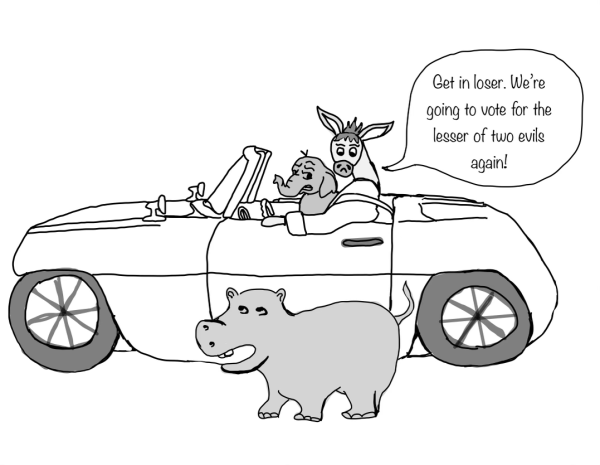The same candidates, the same issues and the same old story about voting for the “lesser of two evils” — the 2024 presidential election is shaping up to be the rematch nobody asked for.
With President Joe Biden and former President Donald Trump coasting to the nominations of their respective parties, American voters have, for now, resigned themselves to deciding between two unpopular candidates. As one independent voter told PBS, “This is probably the most uniquely horrible choice I’ve had in my life.”
Multiply that sentiment a thousandfold for young people who feel disillusioned and disenfranchised by our current political system. It can be hard to know which polls to trust when it comes to younger voters’ outlook on this election, especially this far out, but there are signs that they’re not excited to cast their ballot. In one poll from the Institute of Politics at Harvard Kennedy School taken last year, 49 percent of 18- to 29-year-old voters said they’d vote for president in 2024.

That figure may not seem all that bad at first glance, but it’s down from 57 percent of respondents who said they’d vote in the 2020 election — a difference of millions of votes. The outcome of a national election could again come down to relatively small margins in states like Arizona, Georgia and Wisconsin.
To vote or not to vote? That is the question. The future of the United States might depend on a single young person. But when no candidate seems to share their values or concerns, younger voters — and all Americans — are stuck weighing what to do with their vote this year. Back a third-party candidate or lodge a protest vote, and be lectured about how you’ve just let Trump win. Keep “ridin’ with Biden,” and be accused of ignoring where his campaign promises have fallen short.
Many voters cannot excuse the flaws and failures of this year’s presidential contenders despite the immense support they’ll draw come election day. Granted, no candidate for office has ever been perfect. But can’t we do better as a country?
Evidently, the answer is no. Our political institutions have been unable to produce and empower a new generation of leaders. Biden is 81 years old; Trump is 77 years old. The median age for members of Congress last year was slightly younger: 65 years old in the Senate, a record high, and 58 years old in the House. And while age can bring wisdom and experience, it does not necessarily bring new perspectives.
By and large, young Americans want a say in how their country operates. It’s why they run for office, volunteer for campaigns, protest on college campuses and demonstrate in front of the White House — then and now. Sitting on the sidelines is no way to make change. But for many young people, the notion that a 20th-century government could meet the challenges of the 21st century is beyond parody. This is an age of streaming and self-driving cars, not rotary phones and radio shows.
It remains to be seen whether younger voters turn out this year, but now is the winter of their discontent. They are angry and apathetic, frustrated and fearful about the direction of our country and it seems as though the binary choice between the current president and a former president will do little to stave off disaster.
Voting can be the difference between whether we make war or peace and stand for justice at home and abroad. And with stakes like that, no one, least of all young people making their first forays into politics, wants to have their vote taken for granted. So when politicians waste the opportunity of their office and betray voters’ trust, do they really deserve another term in office?
Perhaps all young people eventually come to grips with how the game of politics is played, but this generation is still learning that painful lesson.
The editorial board consists of Hatchet staff members and operates separately from the newsroom. This week’s staff editorial was written by Opinions Editor Ethan Benn based on discussions with Contributing Culture Editor Jenna Baer, Editorials Assistant Paige Baratta, Contributing Social Media Director Anaya Bhatt, Contributing Opinions Editor Riley Goodfellow and Social Media Director Ethan Valliath.


